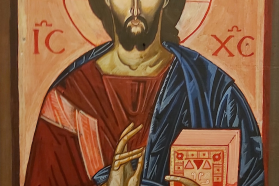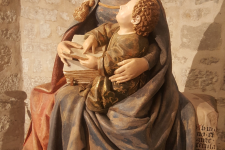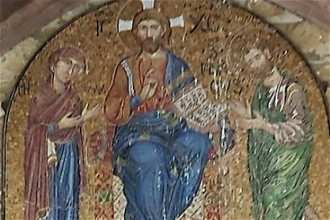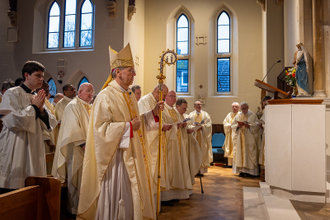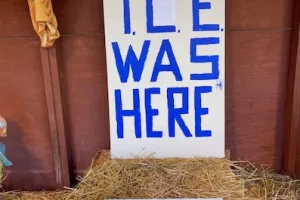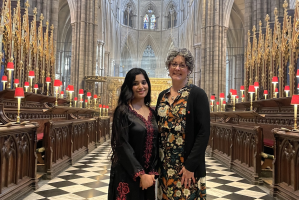Sunday Reflection with Canon Robin Gibbons - 8 August 2021
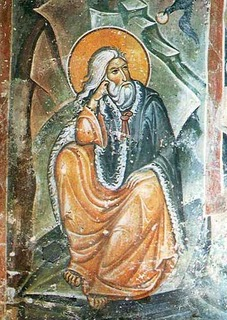
19th Sunday in Ordinary Time
How do we manage to be so unimaginative when it comes to our faith? We know Jesus spoke in parables, that in what he says to us there are layers of meanings. We are also reminded that the Holy Spirit will help us unlock mysteries (not secrets for the Most High, unlike us, does not have secrets) that is truths, insights, part of a growing relationship with the One beyond all names whom we seek and find in the Triune God.
So why do we try to boil down the beauty of mystery into bare doctrinal phrases, or worse still become partisan? Perhaps thinking we have 'the' right answer when in fact we haven't got the answer at all, for our knowledge is imperfect as Paul reminds us in I Corinthians 13! This is not to say we haven't got a grasp on truths that belong to our understanding of Christian faith, we have, but it's our capacity for making walls around these insights given, demanding one answer where many are in fact required, that causes us all so much trouble!
Take the phrase 'Bread of Life', immediately many of us will see in that a connection with the Eucharist, nothing wrong there, but will we allow that insight to develop, enrich, show us other connections, open out other encounters? Are we even capable of allowing that kind of growth, a very real tradition of handing on in developing ways? That is the million-dollar question! Perhaps we ought to let scripture speak in a different way, so let's take four verses from chapter 6 in John's Gospel this Sunday and see where this might lead us in reflective prayer :
V 44. 'No one can come to me unless the Father who sent me draw him, and I will raise him on the last day'
V 45b 'It is written in the prophets:
'They shall all be taught by God.'
V 47. 'Amen, amen, I say to you, whoever believes has eternal life', and lastly
V 51. 'I am the living bread that came down from heaven; whoever eats this bread will live forever; and the bread that I will give is my flesh for the life of the world.'
Are they straightforward statements by Jesus? For those of us with a high Eucharistic theology, does this challenge us to look at what we accept and believe? I hope so, for it does challenge me, and I have been in the business of teaching theology for 40 years. Like many before me, as I grow older, I sense that the wisdom of God is far, far beyond my comprehension, but in my own faith, in that world of imagination, thought, art, literature and story, I can learn to touch the infinite, I can make a real connection with the Holy!
So what of my four verses? Well lets take them gently, it is clear from them that human knowledge is certainly not the only road to understanding Jesus. He is abundantly clear that the initiative comes from God, our response is not supposed to be casuistry or intellectual debate but a deeper call to trust in a faith, for belief, even if it is rudimentary, is essential to this encounter. Somehow the image of the 'bread of life' is richer and far more than any doctrinal belief in the Eucharistic elements. Yes, we are to consume this bread, which is living (because remember whatever it is we EAT, make it part of ourselves) but it is much more, it gives us eternal life, it connects outside of ourselves to the living flesh of the Christ, not his human physical body, but the transformed, transfigured gift from heaven, which is also his mystical body of which we are also a part, and it is this in all its fullness of presence that gives life to the whole world.
I won't write much more on this because I feel that at this point we need to pray, take hold of ourselves before the mystery, and be a bit like Elijah in the first reading, who despondent, wishing for death is then miraculously and physically fed in order that he might make a journey to Horeb, where he meets God, for it is there that the Holy One passes by! In a passage of huge spiritual power and tremendous insight we are told about a series of physical encounters with the elements, which end with this surprise: 'And after the fire there was only a gentle whisper. When Elijah heard it, he pulled his coat over his face. He went out and stood at the entrance to the cave.'
( I kings 19: 12b-13) It is only then after all the demonstrations of power have been exhausted, that the Holy One speaks in gentleness, or as one version translates even more powerfully 'in sheer silence'. How does that link to Jesus? In him the manifestation of that gentle voice, the sheer silence of the Living God is heard and 'seen' amongst us, but not understood until after the resurrection, when as Jesus the Christ he is revealed to those who listen to him and discover who he truly is.
And so?
Well my own plea is to listen for that 'sheer silence', not an absence of noise but a fullness of presence, which comes in the guise of gentleness, of that moment when words are irrelevant and the heart and soul are filled with love, which we in our paucity of imagination so often miss in our engagements with each other. Then I hope for the sheer silence of presence found in reverence for what is important, firstly for other people, the icons of Christ, individuals called by Christ to follow him, be loved by him and redeemed by him, secondly for a deeper love and respect for Scripture especially the Word which is Christ, to let it speak from its deep silence to our hearts. Then thirdly to listen to the silence of the stranger and outcast and in gentleness welcome them, for they truly are Christ for each of us., and lastly for creation especially for living things. If these encounters are understood well we find ourselves becoming part of the liturgy of the Kingdom, where we are all in all, and where instead of the incense offering we are part of what is offered. It is as the letter to the Ephesians puts it so well:'to'… 'be imitators of God,* as beloved children, and live in love, as Christ loved us and handed himself over for us as a sacrificial offering to God for a fragrant aroma.' (Eph 5:1,2)
That image of ourselves as incense being consumed as offering, is the hope that this is what our life will also be, and in ministry and mission makes of us a fragrant aroma honouring others and the Kingdom. I ask Thomas Merton to give an insight into this offering of our own personal burnt out incense: "Our job is to love others without stopping to inquire whether or not they are worthy. That is not our business and, in fact, it is nobody's business. What we are asked to do is to love, and this love itself will render both ourselves and our neighbours worthy." Amen to that!
Lectio Divina
I Kings 19: 11-13
Elijah meets God at Horeb
He said, "Go out and stand on the mountain before the Lord, for the Lord is about to pass by." Now there was a great wind, so strong that it was splitting mountains and breaking rocks in pieces before the Lord, but the Lord was not in the wind; and after the wind an earthquake, but the Lord was not in the earthquake; and after the earthquake a fire, but the Lord was not in the fire; and after the fire a sound of sheer silence. When Elijah heard it, he wrapped his face in his mantle and went out and stood at the entrance of the cave. Then there came a voice to him that said, "What are you doing here, Elijah?"
St Seraphim of Sarov
Prayer, fasting, vigils, and all other Christian practices, however good they may be in themselves, certainly do not constitute the aim of our Christian life: they are but the indispensable means of attaining that aim. For the true aim of the Christian life is the acquisition of the Holy Spirit of God. As for fasts, vigils, prayer and almsgiving, and other good works done in the name of Christ, they are only the means of acquiring the Holy Spirit of God. Note well that it is only good works done in the name of Christ that bring us the fruits of the Spirit.
Thomas Merton
Conjectures of a Guilty Bystander
At the centre of our being is a point of nothingness which is untouched by illusion, a point of pure truth, a point or spark which belongs entirely to God, which is never at our disposal, from which God disposes of our life, which is inaccessible to the fantasies of our own mind or the brutalities of our own will. This little point of nothingness and of absolute poverty is the pure glory of God in us.
Fr Robin is an Eastern Rite Catholic Chaplain for Melkites in the UK. He is also an Ecumenical Canon of Christ Church Cathedral, Oxford. You can follow him on Twitter: @RobinGibbons2



